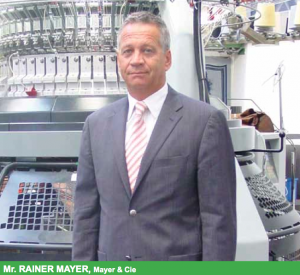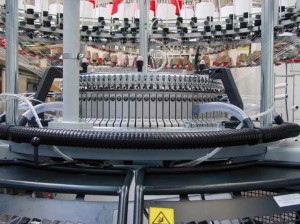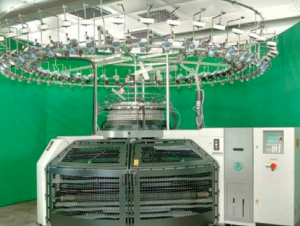 Mayer & Cie showcased its revolutionary innovations at ITMA. The company has developed a circular machine which can spin and knit in one process. The machine, Spinit Systems, was a major attraction at the show.
Mayer & Cie showcased its revolutionary innovations at ITMA. The company has developed a circular machine which can spin and knit in one process. The machine, Spinit Systems, was a major attraction at the show.
For the first time since the first circular knitting machine was introduced, a large extent of the spinning process as well as the entire knitting process has been united in one single jersey machine. The combination allows the production of almost spiral free fabrics along with high savings potential, according to company sources.
Mayer & Cie, the world’s leading circular knitting machine builder by revenues, was developing the Spinit at the company headquarters in Albstadt for a number of years. As per Mayer & Cie, 25 Spinit machines can produce the equivalent of 20,000 ring spinning spindles, 380 winding heads and 20 high speed circular knitting machines.
Spinit is made up of a roving, roving sensor, 3-roller drafting unit, spinning nozzle and circular knitting machine. Mass variation and foreign matter contamination is detected and eliminated during the running process. Further, the machine mounted drafting unit has a maximum delivery speed of 250m/min and the maximum delivery speed of the drafting unit is 10 times faster than in ring spinning.
Among the other machines on display was Relanit 4.0. The latest version is said to achieve 70 rpm for a 30 inch machine during the production of plain single jersey fabric with a speed factor of 2,100, facilitating production quantities of more than 1,500 kg per day, according to the company.
The belt drive is controlled over special servo motors which can be operated from the machine display. This is said to guarantee precise yarn supply, avoiding fluctuations which can occur due to lint and oil accumulation when working with belt drives with quality wheels.
In order to further increase the machine efficiency, the Relanit 4.0 has a computer-controlled knit-on aid which increases yarn tension for the knit-on process automatically for a short time, improving efficiency, according to Mayer & Cie.
Mayer & Cie’s S4-3.2 II R striper was also on display. It is said to be the first striper machine in the world to facilitate production of single jersey striped fabrics with three – or by combination of individual feeders also with more colours – at 3.2 knitting feeders per inch.
While most striped fabrics are generally produced with 1.6 knitting feeders per inch (corresponding to 48 knitting feeders at 30in diameter), the absolute limit for three colours was a maximum of 2.4 knitting feeders per inch.
The new model offers 3.2 knitting feeders per inch (corresponding to 96 knitting feeders at 30 in diameter) and up to four needle tracks and full plating of elastomeric yarns on every knitting feeder. This is said to raise productivity by up to 70 per cent compared with current production levels for 6-colour striping fabrics, as well as offering the possibility to use this machine as a fully-fledged high-performance single jersey machine with a linear speed of 1.56m/s (corresponding to 39rpm at 30in). It is also said to facilitate lower cost production.
The MJ3.2 E DNS fine gauge single jersey jacquard machine with fully electronic needle selection was on display in gauge E60. The unlimited pattern variety possible for extremely fine fabrics opens new collection possibilities, particularly for manufacturers of night and underwear. Manufacturers of technical applications are also likely to show interest in the new fabric qualities, according to the company.
Mayer & Cie’s OVJA 1.6 EE for production of knitted mattress ticking fabrics, with individual electronic needle selection in cylinder and dial, was also on display at its stand. Due to the additional individual needle selection in the dial, particularly sharp contours at the changeover between blister pattern and ground, provide a noticeably better fabrics appearance, according to the company.
In conventional mattress machines with individual needle selection in the cylinder only the floats of the blister yarns are often visible, meaning contours between pattern and ground become fuzzy, says Mayer & Cie.
 More and more manufacturers are said to be taking advantage of needle selection in cylinder and dial in order to differentiate their product from standard fabric. Mayer & Cie has plans to bring these advantages to all markets in all commercial diameters – 38in, 42in and 48in, as well as in frames with roll diameters of up to 1.25m (corresponding to approximately 260kg fabric bales).
More and more manufacturers are said to be taking advantage of needle selection in cylinder and dial in order to differentiate their product from standard fabric. Mayer & Cie has plans to bring these advantages to all markets in all commercial diameters – 38in, 42in and 48in, as well as in frames with roll diameters of up to 1.25m (corresponding to approximately 260kg fabric bales).
Finally the company’s OVJA 1.6 E fine, offering finest gauges upto E36 for double jersey jacquard machines for the fashion domain, with electronic individual needle selection, makes it possible to obtain a constant fabric quality from the first mesh-on by a temperature control system patented by Mayer & Cie.
The temperature control brings the machine to the desired operating temperature before knitting begins and is said to maintain it during production, even at extremely unfavourable temperature conditions in the adjacent area. It avoids changing of distance between yarn guide and needle which can lad to dropped stitches in response to differing temperature conditions. The patented mono magnet selection system ensures reliable needle selection for many years as it does not undergo a mechanical load, says the company.
Mayer & Cie’s S4-3.2 II R striper is said to be the first to produce single jersey striped fabrics with three – or by combination of individual feeders also with more colours.
The overall response was excellent at ITMA 2011, equally from Indian visitors says Mayer & Cie. All most all big Spinners visited the company’s booth for SPINIT.
Mayer & Cie has received confirmed orders for 156 machines valued at Euro 12 million. Of this, orders from India amounted to five per cent.
In India, Mayer & Cie has been working with Batliboi since the 1980s. The company has sold and installed more than 1,800 machines in India, most of them being Relanit, S4-3.2 and OV 3.2 machines.
India is one of the top five major markets worldwide for Mayer & Cie, and the company is keen on expanding the market share for other machines like PES Interlock, mattress ticking and striper.